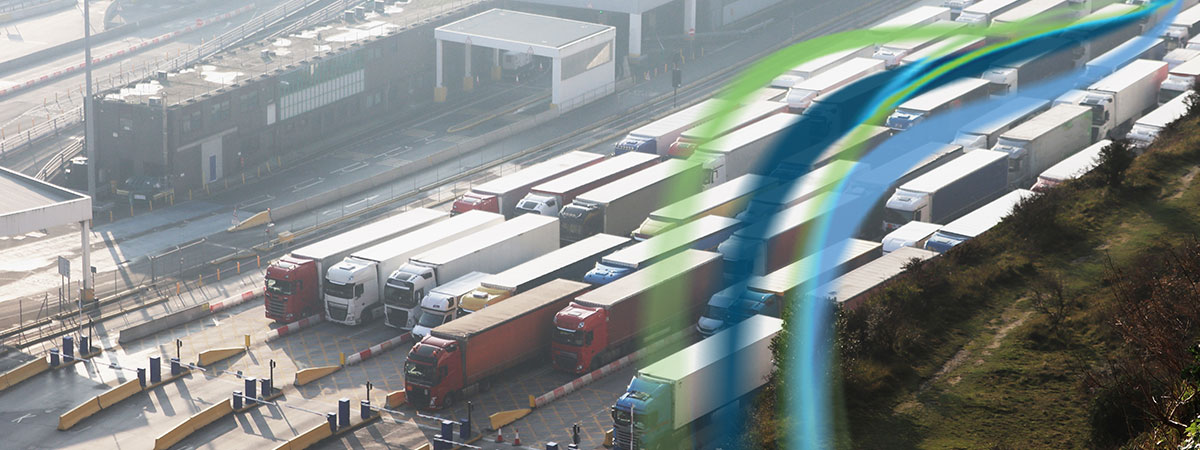Hauliers Warned of Tougher French Customs Controls
Since the UK’s departure from the Single Market and Custom’s Union, the predicted delays on Kent motorways have thankfully been avoided.
Unfortunately, this is set to change with haulage companies being advised to brace for tighter controls at French border control which could potentially see the first significant post-Brexit border disruption. The warnings were shared during two conference calls between British Industry bodies and UK government agencies on the 7th January.
Shane Brennan, CEO of logistics body The Cold Chain Foundation told the BBC that it could take months for the new trade agreements to settle in: “Trade levels are very low. It’s growing from 10% on the 1st January to not yet 50% of the traffic flows that we would normally expect and even at those levels we are experiencing high levels of confusion, delays, businesses….. not being turned back, but being told if they come back with the same level of preparedness next time they will be turned away. So the feeling is that we are building to quite a significant potential disruption.”
Reports suggest that cross-Channel HGV traffic through the Port of Dover and Eurotunnel have been significantly low over the past week and is most likely a result of supply chains stock piling items. Despite low traffic passing through, the Department of Transport advised that only 1% of lorries arrived with the correct paperwork with a further 3% being sent to Manston for testing as drivers arrived without having the necessary negative COVID test result. The Road Haulage Association advised that one in five lorries were being turned away citing both reasons with only 2000 lorries currently crossing the border compared with normal numbers of 5000-6000. Based on these reports, it is clear that the border has not been used at its normal capacity and will be scrutinised in the preceding months as to how it copes.
Failing to Prepare
Chief Economist for the Chartered Institute of Personnel and Supply, John Glen, told BBC news that he was hearing from customs clearance agents in Dover that there was a distinct lack of preparation from businesses and their custom brokers. Whilst he expects this to change over time, he is aware that the people involved are “worried that demand will increase faster than capacity does.”
Elsewhere, the BBC have been reporting disruption at the Irish border with Andrew Kinsella, managing director of Gwynned Shipping, advising them of a backlog of 60 lorries waiting to be shipped to Dublin. He explained that many hauliers are discovering that their customers are not able to generate the special declarations that are required for their goods to cross the border.
“Whilst you don’t see queues at ports and terminals the reality is that these queues are developing elsewhere in our depot at Holyhead, in our depot at Deeside and in our depot at Newport in South Wales and lots of hauliers have depots in the proximity of ports.”
“There are a lot of issues about demarcation about who is going to arrange the export declaration with the UK revenue authorities, who’s going to arrange the import declaration, the hauliers then trying to arrange the import safety and security declaration to create an ENS number which helps you generate a PBN number so there has been a lot of everyone finding their feet.”
Trade Barriers
UK retailers expressed concerns that the new UK-EU trade deal has created trade barriers that are believed to have had a direct impact on cross-Channel and FMCG logistics. Traders now believe that they will be required to pay tax on imports and exports of specific goods including food and clothing that are not completely made in Britain. With so much confusion over paperwork regarding this, some parcel companies have made the decision to suspend their road deliveries to Europe.
The UK-EU trade deal was billed as preserving its zero tariff and zero quota access to the bloc’s single market; however, some major retailers using the UK as a distribution hub for European businesses could face possible tariffs if they re-export to the EU. This could see businesses concentrating on time-consuming workarounds or relocating hubs to the EU.
The British Retail Consortium is seeking short term resolutions for the challenge’s businesses face and is seeking dialogue from the government and the EU to mitigate the long-term challenges new tariffs will pose.
A Perfect Storm of Brexit Disruption
Scottish seafood exporters have described their situation as a, “perfect storm” of Brexit disruption with their industry on the brink of sinking. Donna Fordyce, chief executive of Seafood Scotland speaks on the subject:
“These businesses are not transporting toilet rolls or widgets. They are exporting the highest quality, perishable seafood which has a finite window to get to markets in peak condition. If the window closes these consignments go to landfill.”
According to Fordyce, the sector had already experienced difficulties as a result of COVID-19 and the French border closing at Christmas as well as “layer upon layer” of problems associated with Brexit. Without exports it is feared that fishing fleets will have little reason to go out.
“In a very short time we could see the destruction of a centuries-old market which contributes significantly to the Scottish economy,” adds Ms Fordyce.
Parcel Traffic Affected
Elsewhere DPD, the parcel delivery service has told the BBC that it has suspended its European Road Service due to the “increased burden” of customs paperwork required to be completed on shipments for the EU including the Republic of Ireland. Increased paperwork has seen 20% of parcels identified as “incorrect or incomplete data attached” causing them to be returned.
In a communication with their customers, the business has spoken of a “challenging few days” for the international operation and is planning on restarting the service pending a review on 13th January.
